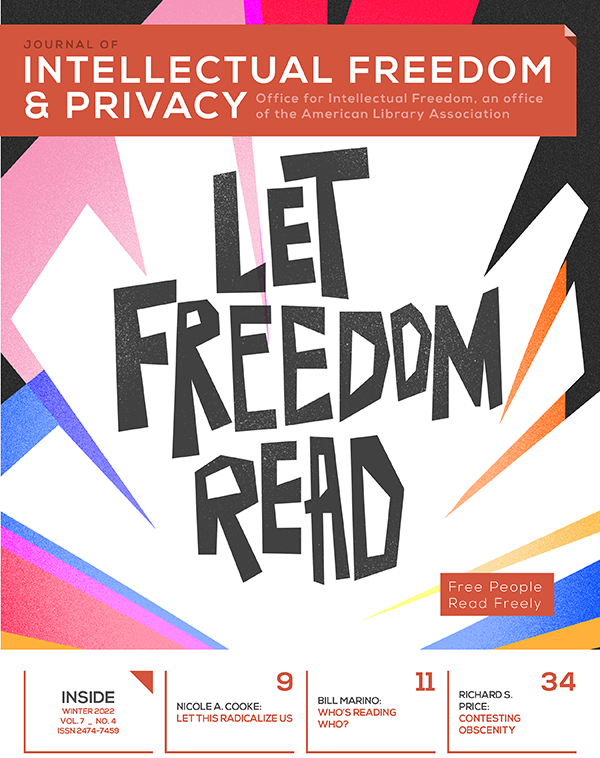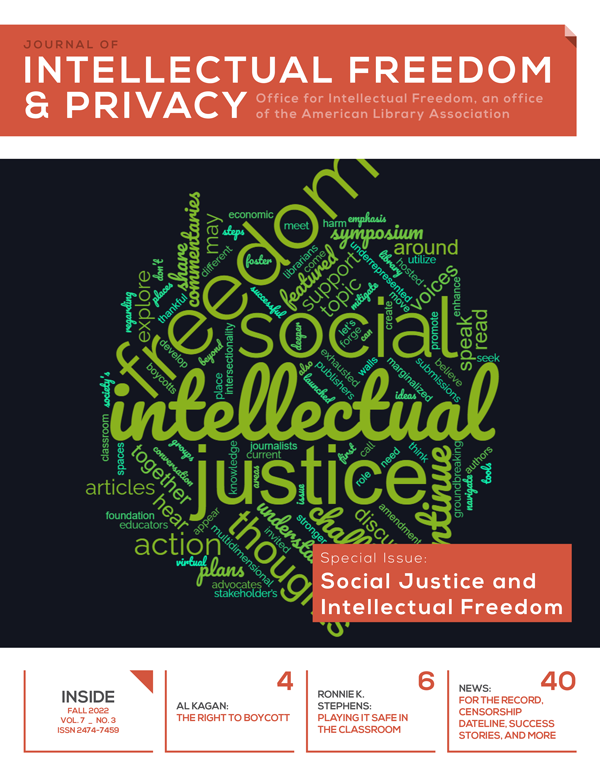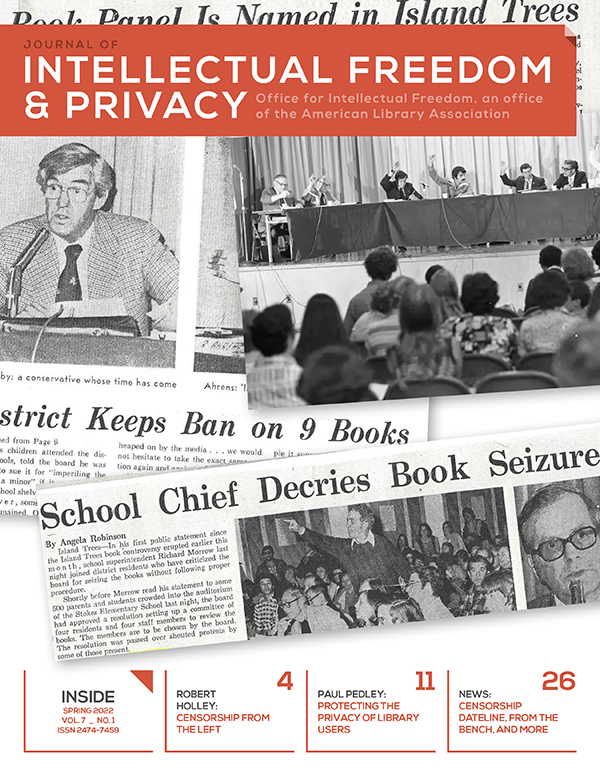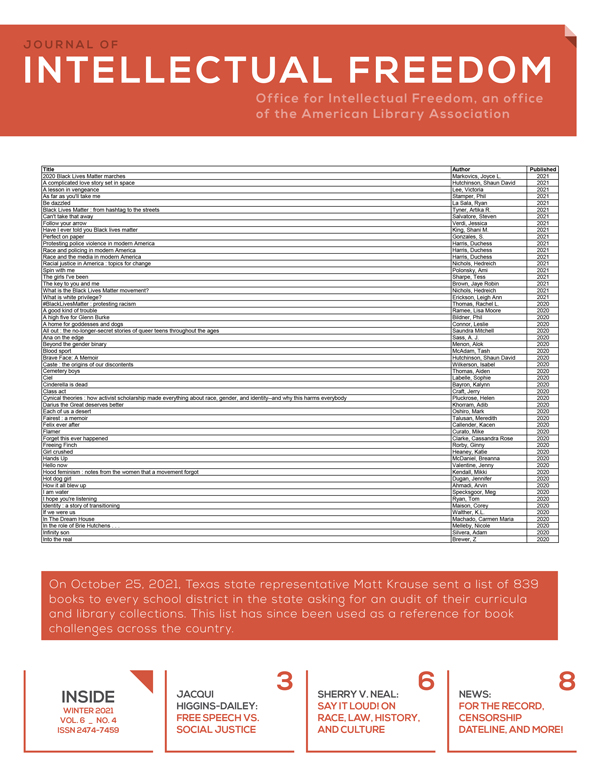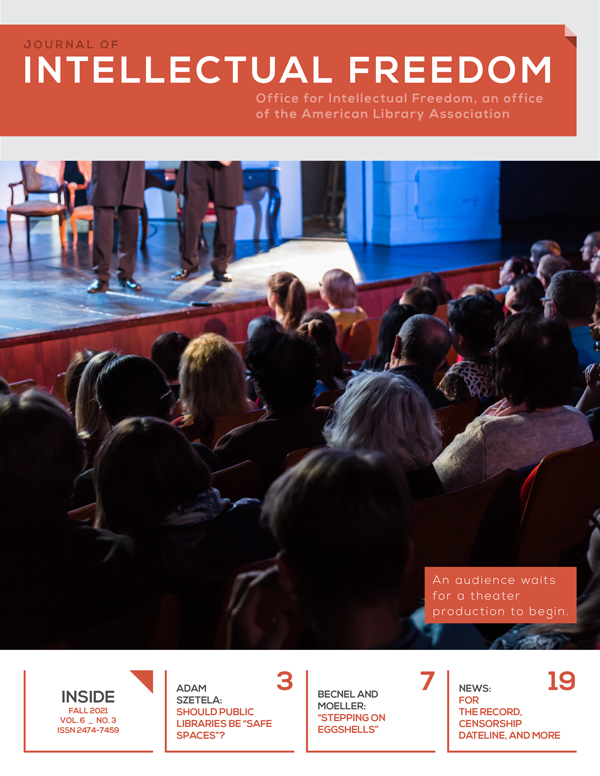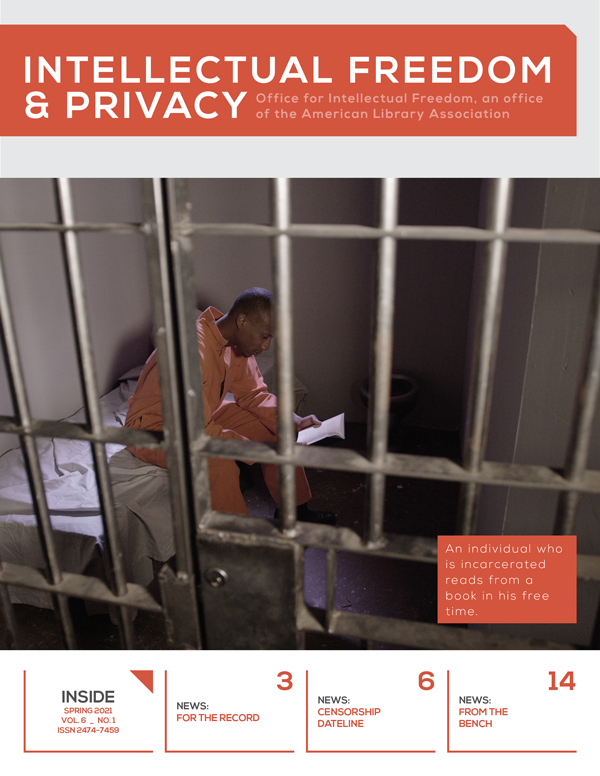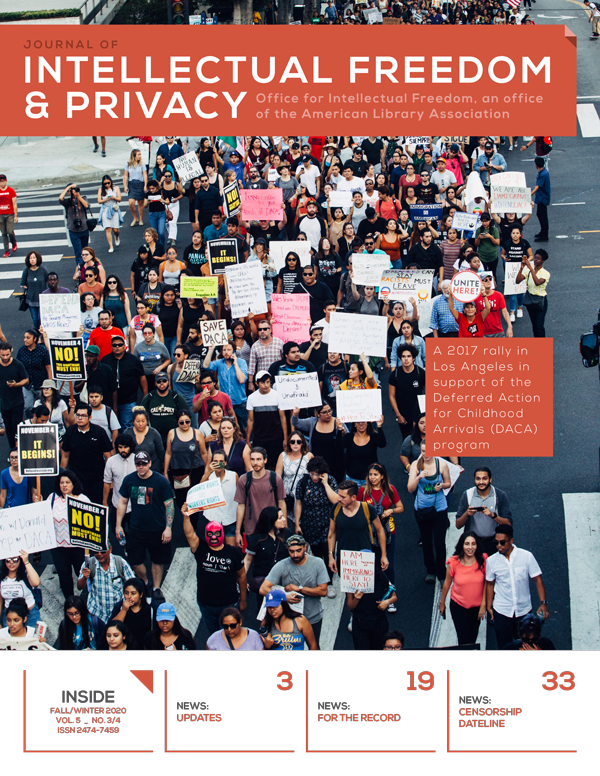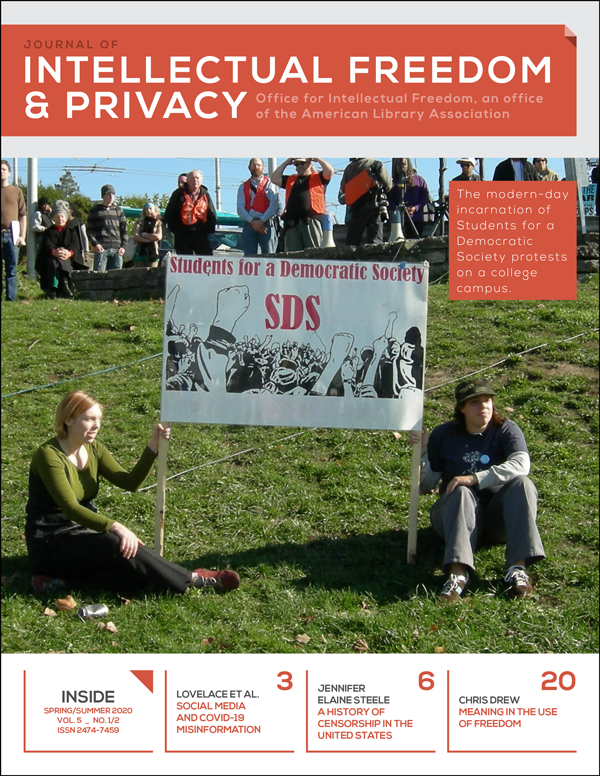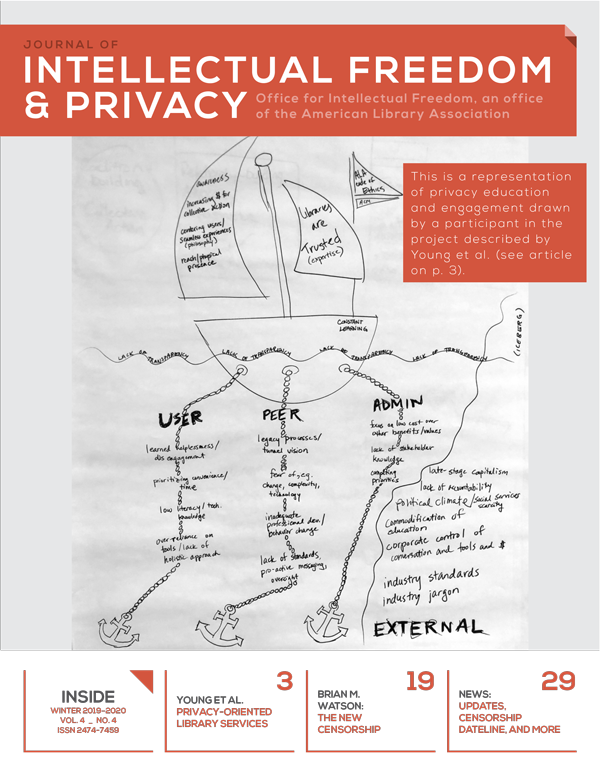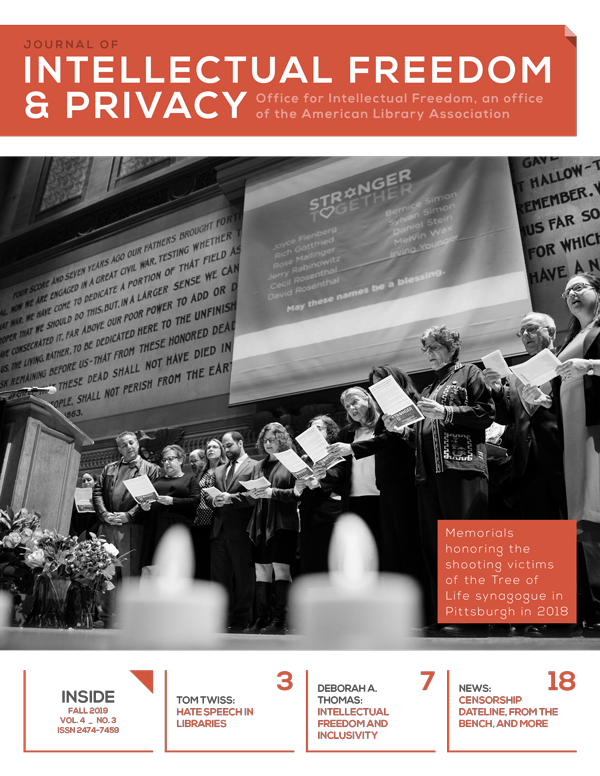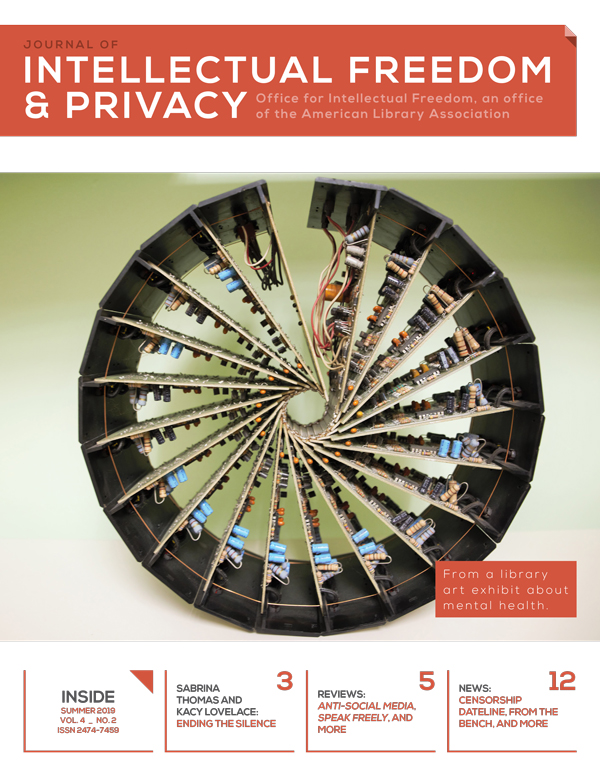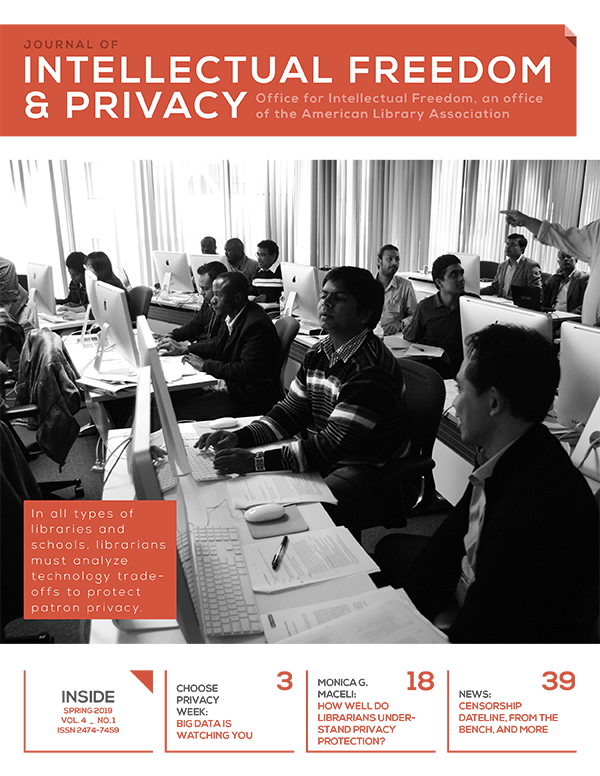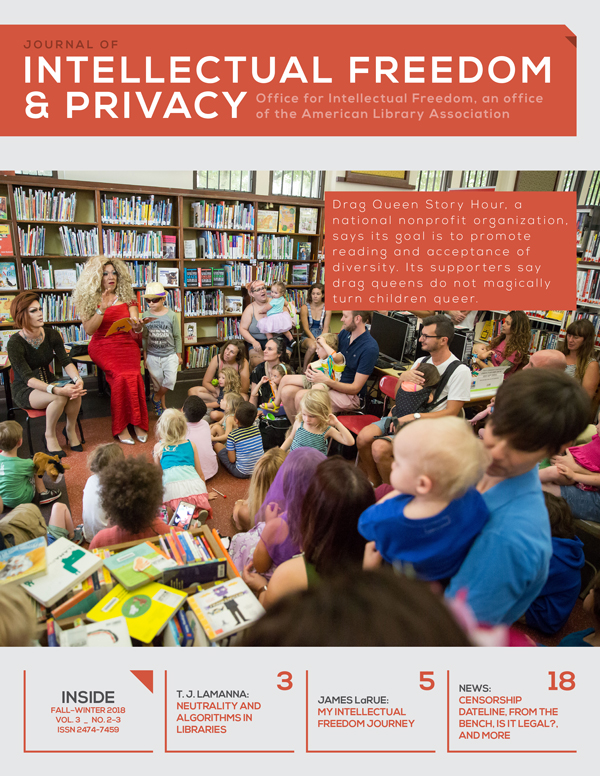2025
2024
2023
2022
Vol 7, No 4 (2022): Winter
Vol 7, No 3 (2022): Fall: Intellectual Freedom & Social Justice
Vol 7, No 2 (2022): Summer
Vol 7, No 1 (2022): Spring
Board of Education, Island Trees Union Free School v. Pico was decided 40 years ago on June 25, 1982. The lawsuit held that the Island Trees Board of Education violated students’ First Amendment rights when they removed nine books from the high school library. The U.S. Supreme Court decided in favor of the students’ right to read freely.
The nine books that were removed were:
- Slaughterhouse-Five, by Kurt Vonnegut, Jr.
- The Naked Ape, by Desmond Morris
- Down These Mean Streets, by Piri Thomas
- Best Short Stories of Negro Writers, edited by Langston Hughes
- Go Ask Alice, of anonymous authorship
- Laughing Boy, by Oliver LaFarge
- Black Boy, by Richard Wright
- A Hero Ain’t Nothin’ but a Sandwich, by Alice Childress
- Soul on Ice, by Eldridge Cleaver
2021
Vol 6, No 4 (2021): Winter
Vol 6, No 3 (2021): Fall
Our feature peer-reviewed article focuses on the perspectives of school librarians regarding the book Drama by Raina Telgemeier. This book, written for ages ten and up, features middle schoolers trying to produce a play; some people feel that a brief kiss between two boys makes this book controversial. Indeed, in this issue’s article, most respondents display some hesitancy toward selecting the book for their school.
On the front cover, we see an audience waiting for a dramatic production to begin on stage. This symbolizes both the play that is the center of Drama and the anticipation students might feel about being able to read this book.
Vol 6, No 2 (2021): Summer
In this summer issue of JIFP, the commentaries focus on privacy and remark on people’s relationship with digital platforms during the COVID-19 pandemic. This issue’s cover of a doctor holding a digital tablet demonstrates that, during the COVID-19 pandemic, the use of telehealth increased exponentially. In “HIPAA and Telehealth: Protecting Health Information in a Digital World,” author Melissa Kovac examines the Healthcare Information Portability and Accountability Act (HIPPA), from its enaction in 1996, to where it stands today with the popularity of telehealth and electronic health records. Kovac notes that telehealth services can be convenient and cost-effective, while also vulnerable to privacy and security breaches. “Health information is some of the most intimate information there is,” writes Kovac, “and patients’ right to privacy and the security of their data must be preserved, no matter what the technology.” In the commentary “Extending Privacy Harms Toward a Non-Economic Perspective,” authors Christopher Muhawe and Masooda Bashir explore data breach cases in the US courts and the requirement that victims must prove they have suffered an “injury in fact.” The authors suggest a new approach that addresses privacy harms without having to prove economically quantifiable harm.
Cover credit: Rido/Shutterstock.com
Vol 6, No 1 (2021): Spring
This issue of the Journal of Intellectual Freedom and Privacy includes two news stories about book restrictions and bans in jails. In Pennsylvania, a county jail initiated a policy banning individuals who are incarcerated from purchasing books from retailers that were previously allowed. Inmates only had access to a limited list of titles through the jail’s tablet program, which charged per minute and had time restrictions. (More information can be found on page 3.) In Arkansas, a local sheriff’s office removed all reading material other than the Bible and other printed religious material from the county jail, indicating that the removal was because of inmates damaging and destroying books. Requested public records showed no documentation of this destruction. (More information can be found on page 13.)
Cover credit: Skyward Kick Productions/Shutterstock.com
2020
Vol 5, No 3 (2020): Fall/Winter
When the Trump administration ordered the end of Deferred Action for Childhood Arrivals (DACA) program in 2017, rallies and protests erupted nationwide. This issue’s cover shows the September 5, 2017, rally in support of DACA in Los Angeles. Colleges and other entities sued to stop the administration from ending the program. In June 2020, the US Supreme Court ruled that the administration acted impulsively in ending the program and that the repeal be vacated. In July 2020, the Trump administration indicated that it will not process new DACA applications and that it will limit the renewal term for current recipients to one year instead of two. More information can be found on Page 5.
Cover credit: “Defend DACA” by mollyktadams is licensed under CC BY 2.0.
Vol 5, No 1 (2020): Spring/Summer
The Students for a Democratic Society (SDS) were a nationwide student organization, representative of the New Left in the 1960s. The group pushed for, among other things, racial and sexual equality; an end to the police state, the draft, and war; democratized universities; labor rights; and poverty justice. SDS had hundreds of chapters across the United States, but they splintered over just how radical to be. The name was relaunched in 2006 as a new left-wing
student group.
Vol 4, No 4 (2020): Winter
2019
Vol 4, No 3 (2019): Fall
In 2018, a gunman killed 11 people at the Tree of Life synagogue in Pittsburgh, Pennsylvania. One of the commentaries in this issue (see page 3) is written by Tom Twiss, a Pittsburgher and member of the Social Responsibilities Round Table (SRRT) of the American Libraries Association (ALA). In his commentary, he describes the way the city of Pittsburgh rallied around the Jewish community with the slogan “stronger than hate” to drown out the voices of hate.
Twiss writes about the problem of including “hate speech,” and groups that promote it, in libraries. The ALA Executive Council first voted to explicitly include “hate groups” in its meeting room policy, but then rescinded that phrasing after much controversy. He depicts the inherent tension between intellectual freedom (which would argue for allowing all points of view, including abhorrent ones), and making libraries welcoming spaces for traditionally marginalized communities (which would foreclose such speech in libraries). Twiss concludes with several recommendations from the SRRT that would strengthen libraries’ commitments to marginalized groups.
Vol 4, No 2 (2019): Summer
The image on the front cover of this month’s issue is of “Gate,” artwork created by Deacon Stone in 2006 and featured in the Drinko Library art exhibition at Marshall University. The exhibit was designed to explore perspectives on mental health in the library. For more information, please see the commentary featured on page 3.
The artist describes his work: “‘Gate’ is from a series of gates created from assemblages, comprised of objects found or forged. The works are an exploration of boundaries both self-imposed and perceived, and contemplations of how humans—as masters of categorization and organization—attempt to understand the world by designations; creating boundaries, limits, and arenas.
“As a son of the hills, raised in a Pentecostal tradition of Appalachian Mysticism, challenged by the expansion of boundaries that comes with a good liberal arts education, I had—and have still—so many perceived boundaries to erase; closed gates through which to pass, others to do away with altogether.
“The critical lesson in this journey has been that while we take comfort in our categorizations, or cocoon into the safety of in-group favoritism, we must be ever wary of out-group hostility which is an inevitable result. As physical objects, these gates are attempts at relegating our divisiveness and instinctive categorization to the history books … a recollection of how we used to think, feel, and behave.”
Vol 4, No 1 (2019): Spring
In this issue of JIFP, we include several commentaries from Choose Privacy Week 2018 and a feature article by Monica Maceli that addresses librarians’ conceptualizations of the internet and privacy-protecting technologies. As these writings make clear, privacy is a central concern of librarianship—it is part of our code of ethics, our core values, and is now incorporated in the Library Bill of Rights.
In addition to the standard concerns about patron privacy, such as circulation records and computer usage logs, librarians now must consider third-party vendors and services, companies that track users across different platforms and websites, and the aggregation of vast amounts of user data.
Many patrons rely on the library for access to computers, but is that access compromised through a lack of privacy? It can be difficult to discern this, particularly when librarians themselves may not fully understand what is happening to data or how it can be protected (as Maceli illustrates). Nonetheless, precisely because patrons do rely on us as trusted intermediaries and experts, librarians must develop and hone privacy-protecting skills. We need to become familiar and practiced with privacy-protecting technologies and resources, then implement them in our libraries, as much as possible.
2018
Vol 3, No 2-3 (2018): Fall-Winter
With this issue of the Journal of Intellectual Freedom and Privacy (JIFP), we begin including a new section of News, focused on drag queen story hours. These are events, often coordinated through a national non-profit group, at which drag queens (and sometimes kings) read books and sing songs with children—just like any other story time at a library, except with an exciting guest leader.
As the popularity of these events has spread, so has anger, concern, and hatred over them. The Office of Intellectual Freedom (OIF) and JIFP firmly support the right of public libraries to decide what programming is appropriate for their local communities, including the presentation of drag queen story times. These events introduce and reinforce concepts of tolerance, respect, compassion, and self-worth—which seem like messages that all can benefit from.
2017
Vol 2, No 1 (2017): Spring
2016
Vol 1, No 1 (2016): Spring
We are so pleased to introduce the first issue of the Journal of Intellectual Freedom and Privacy (JIFP). JIFP is an expansion of The Newsletter on Intellectual Freedom (NIF), published between 1952 and 2015. Ever mindful of serials librarians’ woes, we hereby state that this new publication is a continuation of NIF, but begun over with vol. 1, no. 1.

